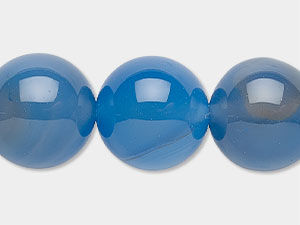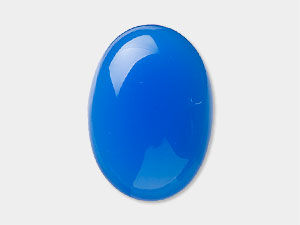Agate, Blue Meaning and Properties
Blue Agate History
Agate gets its name from the Achates River in present-day Sicily. It was where the stone was discovered by a Greek naturalist sometime between 400 and 300 B.C. In its natural form, agate—especially South American agate—is often grey. Like many other variations of agate, the color in blue agate is most often achieved through dyeing, although some blue agate, such as "Holley blue agate" and blue lace agate occur naturally (see our Gem Note for blue lace agate). The art of dyeing was known to the Romans; however, dyeing agate has been a closely guarded secret that has been perfected in Idar-Oberstein, Germany, one of the most important centers for cutting and dyeing since the early 16th century.
What are the Metaphysical Properties Blue Agate?
Agate is the birthstone for the Zodiac sign of Gemini but is not a traditional birthstone for a birth month. Blue agate meaning is associated with truth, loyalty and reliability. Its importance for healing has been recognized since the Golden Age of Greece. It was revered in ancient Indian and Chinese civilizations. When exploring gemstone symbolism, blue agate meaning frequently comes up in discussions of throat chakra support. And poise and serenity have always been associated with blue light. Even the expression "feeling blue" comes from blue's cool, sedative effect. No wonder even people who don't "love blue" are drawn to people who do.
What Chakra is Blue Agate?
Believed to influence everything from emotional harmony to how we express our truth, chakras are thought to respond to the quiet presence of meaningful stones. Blue agate, with its vivid, sky-toned hue, is commonly associated with the throat chakra, the seat of communication and authentic expression. Though its brilliant blue may be the result of human artistry, the grounding nature of agate itself is said to support clarity, calm and honest self-expression.
Throat Chakra (Vishuddha) - Teal or Light Blue
- Location: throat (thyroid)
- Represents: communication; growth via expression; secrets
- Emotional issues: communication; independence; listening; creativity; fluent thought
- Spiritual issues: sense of self; freedom to speak truth
- Physical issues: thyroid; esophagus; speech and other communication problems
- Gemstones: aquamarine, blue lace agate, turquoise, blue agate
What is Blue Agate Made From?
Like most other agates, blue agate is a chalcedony, a member of the quartz family of minerals. Agate is formed as a nodule in volcanic rocks, lava or from filled veins or cracks in the volcanic rock. To achieve blue from other agates, iron pigment is used in the dye process. Agate is found in deposits all over the world, including Myanmar (Burma), Brazil, Uruguay, Botswana, India, Australia and the United States.
- Mineral Information: Microcrystalline quartz, banded chalcedony, infused with iron
- Chemical Composition: SiO2
- Color: Blue
- Hardness: 6-1/2 to 7 (Mohs)
- Specific Gravity: 2.60 – 2.65
- Refractive Index: 1.544 – 1.553
How Do You Clean Blue Agate?
Like other agates, blue agate can be cleaned with warm soapy water and a soft brush. Avoid exposure to household chemicals and extreme heat. Because of the hardness and durability of agate, it should be kept away from other gemstones and jewelry to prevent scratching softer materials.
Blue Agate FAQ
Q: Is blue agate the same as blue lace agate?
A: Blue agate and blue lace agate are not the same. Blue lace agate is a naturally occurring stone, known for its soft blue tones and delicate, lacy banding. In contrast, blue agate is typically created by dyeing white or gray banded agate, which readily absorbs vibrant color, giving it its striking blue appearance.
Q: Is blue agate hard enough for everyday wear as a bracelet?
A: With a Mohs hardness of 6-1/2 to 7, blue agate can be used as a bracelet.
Q: Why is blue agate typically dyed?
A: Blue agate does not occur naturally. It’s made by dyeing white or gray banded agate through chemical processes that enhance the stone with a vivid blue hue.
Q: Can you drill a hole in a blue agate cabochon?
A: You can drill a hole in a blue agate cabochon using a diamond-coated drill bit and plenty of water to keep the stone cool and reduce cracking. Drill slowly with light, steady pressure, ideally from both sides to avoid chipping. Securing the cabochon firmly and using a clay dam to hold water can also help protect the stone during drilling. If you’re new to drilling, practicing on a scrap stone first is recommended.
Designing with Blue Agate
If blue is your color (it is "the color" for millions), the jewelry you create with this vibrant sky-blue agate will be a must-have. If you're creating jewelry for "blue purists," try combining this semitranslucent stone with a variety of other blue beads—pale blue lace agate , blue fossil stone or various shapes and shades of Austrian crystal. Enhance it by mixing it with complementary cool colors such as greens and lavenders. Or cool down warm yellows by using blue agate as an accent. Set the cabochons in open-backed pendants so their blue glow shines through. People who love blue will naturally gravitate toward you. Other people will know you have some magic that they want for themselves. They just won't know that it's all in the color!
Shop for Blue Agate
**Please note that all metaphysical or healing properties listed are collected from various sources. This information is offered as a service and not meant to treat medical conditions. Fire Mountain Gems and Beads® does not guarantee the validity of any of these statements.
How did you like this resource? Your feedback helps us provide resources that matter to you most.
Copyright Permissions
All works of authorship (articles, videos, tutorials and other creative works) are from the Fire Mountain Gems and Beads® Collection, and permission to copy is granted for non-commercial educational purposes only. All other reproduction requires written permission. For more information, please email copyrightpermission@firemtn.com.


